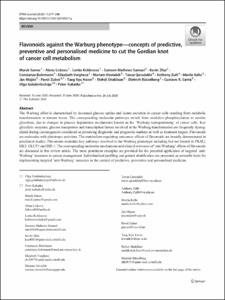Flavonoids against the Warburg phenotype-concepts of predictive, preventive and personalised medicine to cut the Gordian knot of cancer cell metabolism
- Affiliated Author(s)
- 권택규
- Alternative Author(s)
- Kwon, Taeg Kyu
- Journal Title
- The EPMA journal
- ISSN
- 1878-5085
- Issued Date
- 2020
- Keyword
- Predictive preventive personalised medicine (PPPM / 3PM); Cancer; Warburg phenotype; Flavonoids; Anticancer effect; Cell metabolism; Co-morbidities; Malignancy; Disease manifestation; Age; Patient stratification; Aggressive metastatic disease; Multi-omics; Biomarker patterns; Liquid biopsy; Modifiable risk factors; Risk assessment; Microcirculation; Systemic hypoxia; Ischemic lesions; Prognosis; Individualised patient profiles; Treatment algorithms; Liver malignancy; Triple-negative breast cancer; Prostate cancer; Pregnancy; Chemoresistance; Radioresistance; Glucose metabolism; Oxidative phosphorylation; Proliferation; Metabolic reprogramming; Positron emission tomography; Magnetic resonance spectroscopy; Tumour imaging; FDG-PET; Glucose intake; PET-CT; Individual outcome; Palliative medicine; Polyphenols; Glycolysis; Carcinogenesis; Prognostic markers; Aerobic glycolysis; Glycolytic inhibitors; Pleiotropic activity; HIF-1
- Abstract
- The Warburg effect is characterised by increased glucose uptake and lactate secretion in cancer cells resulting from metabolic transformation in tumour tissue. The corresponding molecular pathways switch from oxidative phosphorylation to aerobic glycolysis, due to changes in glucose degradation mechanisms known as the 'Warburg reprogramming' of cancer cells. Key glycolytic enzymes, glucose transporters and transcription factors involved in the Warburg transformation are frequently dysregulated during carcinogenesis considered as promising diagnostic and prognostic markers as well as treatment targets. Flavonoids are molecules with pleiotropic activities. The metabolism-regulating anticancer effects of flavonoids are broadly demonstrated in preclinical studies. Flavonoids modulate key pathways involved in the Warburg phenotype including but not limited to PKM2, HK2, GLUT1 and HIF-1. The corresponding molecular mechanisms and clinical relevance of 'anti-Warburg' effects of flavonoids are discussed in this review article. The most prominent examples are provided for the potential application of targeted 'anti-Warburg' measures in cancer management. Individualised profiling and patient stratification are presented as powerful tools for implementing targeted 'anti-Warburg' measures in the context of predictive, preventive and personalised medicine.
- Department
- Dept. of Immunology (면역학)
- Publisher
- School of Medicine (의과대학)
- Citation
- Marek Samec et al. (2020). Flavonoids against the Warburg phenotype-concepts of predictive, preventive and personalised medicine to cut the Gordian knot of cancer cell metabolism. The EPMA journal, 11(3), 377–398. doi: 10.1007/s13167-020-00217-y
- Type
- Article
- ISSN
- 1878-5085
- Appears in Collections:
- 1. School of Medicine (의과대학) > Dept. of Immunology (면역학)
- 파일 목록
-
-
Download
 oak-2020-0294.pdf
기타 데이터 / 3.01 MB / Adobe PDF
oak-2020-0294.pdf
기타 데이터 / 3.01 MB / Adobe PDF
-
Items in Repository are protected by copyright, with all rights reserved, unless otherwise indicated.